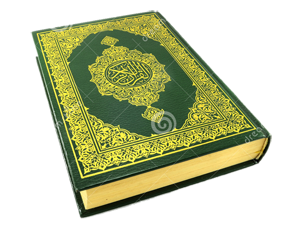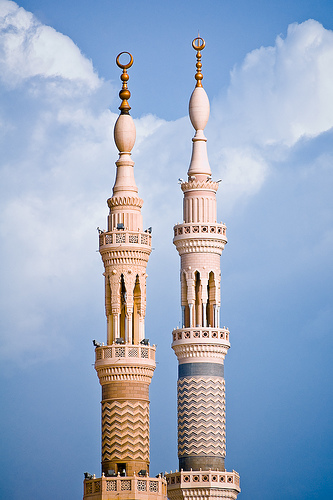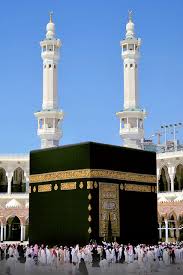The Origin of Life - an Islamic Perspective
The Origin of Life - an Islamic
Perspective
Yahiya Emerick
Science must increase our faith. It is wrong for anyone to close their eyes to what is right in front of them. For a Muslim the evidence of dinosaurs and fossils is not a threat to our beliefs. Rather, it is a confirmation of the power of God.
Why Does God Tell Us About the Creation?
The Holy Qur’an is the book given to us by the Creator of the Universe. God, (literally: The God) which is His personal Name, knows us best and is aware that humans can be very skeptical creatures.
God points out, "...if you were to seek a tunnel into the earth or a ladder into the skies and bring them a sign, (they still wouldn’t be convinced.) If it were God’s will, He could gather them all into true guidance, so don’t be among those who are influenced by ignorance." (6:35)
God, the Keeper of Wisdom, makes it a point to give as many proofs in the Qur’an about His existence and creative abilities as possible so the maximum number of humans can be guided. We need proof, and God gives us that proof. (2:26, 40:57)
God, of course, does not need us to follow Him, or believe in Him. As He states, "God can do without them and God is free of all needs." (64:6)
He merely wishes that people would choose to believe in Him so He can reward them for their choice. God is ready to forgive even those who acted wrongly if they but ask for His forgiveness.
In a Hadith, or saying of the Blessed Prophet Muhammad, we learn, "When God decreed the creation (of the universe,) He set down in His book which is with Him, ‘Indeed, My mercy is stronger than My wrath.’" (Bukhari & Muslim. Also see 6:12)
Among the proofs given in the Qur’an for us to learn from is a very detailed explanation of the different features of the universe, how it was made and how the planets and stars were formed. God says that, "To Him is due the origin of space and the Earth." (6:101)
Of course, most people who lived at the Prophet’s time would never have understood what those verses really meant scientifically, but they accepted them anyway and interpreted them as best they could. Sometimes they came up with very interesting explanations.
God instructs us to accept everything in the Qur’an, even if we don’t yet know how to understand it. The understanding of the Qur’an grows with each passing generation. As He said, "The intelligent people declare, ‘We believe in the book, the whole of it is from our Lord." (3:7)
Modern Science and Islam.
Modern day scientists have been awe-struck at how complex and intricate the universe is. (67:3-4) The sciences of astronomy, chemistry, astrophysics and molecular biology have pushed the limits of our knowledge ever further.
These new discoveries have assisted greatly in the understanding of what the ayat in the Qur’an mean. For example, there is a section of verses where God mentions that during the process of human development, there is a stage where we were an ‘Alaq in the womb. (96:1-5) The word literally means, "a clinging thing." But no one knew in past centuries how that could be part of the process of growth for a fetus.
So translators, commentators and scholars have tried to explain it as meaning we were clots of blood or other such strange things in the womb. But new discoveries in the last few years have shown that in the early stages of pregnancy, the fertilized egg actually attaches itself to the uterine wall and clings there as it is growing. Thus, modern knowledge unlocks another mystery that previous Muslims could only guess at.
The same thing is true in other areas to quite a startling degree. When we study the ayat of the Qur’an relating to the creation of the universe, we come away astounded, especially since they agree with what we have only discovered in the last ten, twenty and fifty years.
The Qur’an does not give a single, unified essay on how the universe began. Instead, keeping with the Qur’anic method of teaching, different aspects of creation are mentioned in different places in order to give authority to the particular lesson being taught. (See 30:58)
For example, in Surah at Tariq, (86) God begins by mentioning the brightest star which appears in the sky at night. Then He describes this star and uses it as a metaphor for how every human has an angel watching over them. Do you see how God uses physical aspects of nature to illustrate spiritual principles?
The Qur’anic History of Creation.
After we find the references to creation in the Qur’an, then we can piece them together to get a picture of how God’s revelation explains the beginning. As Muslims, however, we must not forget to look into the lesson taught in each passage. We must remember what the purpose is for including these signs in the Qur’an so we can be enlightened spiritually as well as mentally.
God begins by stating that the universe and planet Earth took six "days" to create. (7:54) Now it must be remembered that in Arabic the word Youm can mean a day as we know it, or it can mean any stage or period of time. As God points out, a day to him can be a thousand years, fifty thousand years or more.
The creation of planets and the Earth took place in the last two periods of time. As God states in the Qur’an, "Declare, ‘Do you disbelieve in the One Who created the Earth in two stages? Do you make others equal to Him? He is the Lord of all the worlds.’" (41:9)
The process of creation can be summarized as follows: All matter in the universe was compacted together in one place. Then God gave the command and it blew apart scattering molecules and gases in all directions. ("The Big Bang.") The force of this initial explosion keeps the universe expanding.
Space was filled with matter, anti-matter and gases which eventually combined into larger particles. These bits of matter eventually grew into asteroids, planets, stars and moons. Each object of inter-stellar space conformed to a set of physical laws which governed the trajectory of their orbits so a regular pattern of rotation could be seen. (21:33, 29:61)
Stars ignited in a fury of radioactive fusion and gave off light and heat which brought warmth to those planets near them. (86:3) Small moons were captured in the orbit of larger planets and came to have a regular orbit around them, often reflecting light from the sun. (54:1-2)
Finally, the planets themselves developed and formed in a variety of ways with fantastic geologic formations and movements both above and below the surface. (27:61)
The planet Earth, in particular, cooled near its outer layers, forming a thin crust made up of plates that moved and grated against each other. (15:19) This allowed the Earth’s surface to constantly erase the damage caused by occasional asteroid impacts. But the colliding of the plates also had the side effect of raising tall mountains and exposing the geologic history of the planet.
Escaping gases from the ground and water, warmed in the sunlight, eventually raised to a high altitude where they formed a protective layer. This Ozone Layer shielded out harmful radiation and ultraviolet rays from the sun.
After a time, life was to appear but that is the subject of the next lesson. For now, it is amazing that this scientific narrative is almost exactly the same as what God revealed in the Qur’an. Look at the following illustrations showing what happened, what God said about it, and the ayat from which they come.
You will be amazed and can only proclaim your wonder at God’s Revelation. Remember, He mentioned these things to teach us to be believers in Him. If He tells us the truth, we would be fools not to believe in Him. Right?
"Don’t they see anything in the functioning of space and the Earth and in all things God created?" (7:185)
How Can We Know the World Around Us?
As we have learned already, Islamic teachings assume that the Earth and universe are very old. In addition, the Qur’an states clearly that one of the reasons God made us intelligent and self-aware, or Sentient, is so that we can discover the wonders of the natural world around us. In short, God gave us the mission to investigate what He created.
There is so much we don’t know or understand, even about how our own bodies work. With all these fantastic areas of knowledge to pursue, you would think that everyone would recognize their Lord. But some still choose to keep their eyes shut. As God says, "He, (God,) created humans from a drop of sperm and then the same humans become clear arguers!" (16:4.)
But thankfully, not everyone closes their understanding and the world has many fine examples of great scientists and researchers who also put their trust in God.
In our modern world there are so many discoveries in all fields which are giving us a more complete picture of the history of the universe. At the same time, our knowledge of Earth’s past is expanding and revealing some surprising results.
What Do We Know about the Origins of Life?
Today, scientists tell us that life began in the sea when simple molecules bonded together and became self-replicating, or self-producing. These single-celled organisms, quickly took on the characteristics of what we know as algae.
They received their energy from the sun in a process termed Photosynthesis, and as a result of their activity, new gases formed in the air creating a viable environment for more complex forms of life.
As Muslims we can either accept this theory, reject it or modify it according to what we know in God’s revelation. God said in the Qur’an that He created all life from water and raised a protective canopy over the Earth. God knows best and all we can do is study, research, test and reflect.
Scientists further tell us that over millions of years, the first organisms blossomed gradually into many different types and shapes, resulting in plant life, plankton, arthropods and simple fishes. Dinosaurs, higher creatures and mammals followed.
What is Evolution and Creationism?
These discoveries in themselves are not harmful to a healthy belief in God’s creative power to make whatever He wills in whatever way He wishes. But some scientists have tried to say that everything in the universe, even life itself, happened all by chance and accident, without any Divine intervention.
The name of this theory is Evolution and its most famous advocate was a man named Charles Darwin (1809-1882). He was an Englishman who lived during the nineteenth century when Britain ruled most of the world.
He was keenly interested in the origin of life and took a journey around the world to study the plants and animals of Earth. The ship he sailed on was called the HMS Beagle. He spent a particularly long amount of time on the Galapagos Islands, located in the Pacific ocean, examining birds, lizards and giant turtles.
He came to believe that the variety of life in our world was due to what he called "Natural Selection" and "Survival of the Fittest." He wrote his findings in a book entitled, "On the Origin of Species" which he published in 1859.
The book immediately caused a controversy in the Christian world because Christianity taught that God made life in an instant and that Earth was the center of importance in the universe. Christians also felt threatened by Darwin’s teachings because they knew it meant he was saying everything happened without needing God. To this day, many Christians still oppose and do battle in court over whether or not these theories should be taught in school.
These Christians advance the counter- idea of Creationism, or God making things all at once, while modern scientists still promote Evolution, or things happening by themselves accidentally, gradually and naturally. The two sides are as far apart as ever.
What Do Muslims Believe?
Where do Muslims stand? The answer may surprise you for we can agree with aspects of both sides. Islam teaches us that God’s creation is vast and beyond our comprehension. We are also taught that the more we explore and learn, the more we will come to believe in God. That is the Islamic position.
So we assert without any hesitation that God caused the creation of the universe and that He set up the laws for its functioning. As God said:
"Behold! In the creation of space and the Earth and in the changing of night into day are indeed signs for people of understanding. Those who remember God standing, sitting and lying down, and contemplate the (wonders) of creation in space and the Earth. (They declare,) "Our Lord! You didn’t create all of this for nothing. So save us from the punishment of the fire." (3:190-191)
Science, then, must increase our faith. It is wrong for anyone to close their eyes to what is right in front of them. For hundreds of years people have been finding fossils, bones and ancient artifacts which point to a hidden past we don’t know much about. God even commands us to travel over the Earth and learn from what we see. We humans have now seen much to challenge our understanding!
We know that Earth existed long before the appearance of humans. God says, "Wasn’t there a long period of time before humans were even mentioned?" (76:1)
We also know from the geologic timetable that the Earth went through many ages before we came here. And in the verse that mentions this proof of God, we are given a very strong clue about the adaptability of life forms to their environment.
God said, "Don’t you see that God sends rain from the sky? With it We produce plants of various colors. And in the mountains are colored layers, white and red of various tones and some black in hue. And so too, among humans and crawling creatures and cattle. They are of various colors. Those among God’s servants who have knowledge truly fear Him, for God is Mighty and Forgiving." (35:27-28)
So while we agree with the Creationists who say God made the universe, we disagree with them on how fast it was constructed and that Earth is the only center of focus for the Creator. God declares Himself to be the Lord of All the Worlds: Rabb ul Alameen.
Because we do not reject the evidence presented to us by Paleontologists (fossil hunters) and other scientists, we can accept some of what they say, also, about the origins of life on Earth and the existence of dinosaurs and other creatures in the fossil record. However, we read in God’s book that He caused it to happen and that by studying it we increase our faith in Him. Therefore, we disagree with those who say everything happened without God, by mere chance only.
"To God belongs the control of space and the Earth and God has power over all things." (3:189)
Ours is the middle position even as God said we were created to be the middle community: never going to extremes. (2:143) So we don’t accept, based on the evidence, the final positions of both sides. Rather, we accept what appears to be true and reject what appears to be false from each. The Qur’an is our standard, our determiner, and it has never let us down, nor will it ever do so.
For a Muslim, then, the evidence of dinosaurs, trilobites and ancient algae is not a threat to our beliefs. Rather, it is a confirmation of the power of God. As God said, "He has created horses and mules for you to ride and show; and He has created other (creatures) that you don’t know." (16:8)
"God created every creature from water. Of them are some that creep on their bellies, some that walk on two legs and some that walk on four. God creates what He wills for He has power over all things. We have indeed sent signs that make things clear and God guides whom He wills to the straight way." (24:45-46)
Who else but God could have made such a complex and mysterious universe? (16:40) We must have pity on those who reject the proof of God’s existence for they will be the losers in the end.
God says, "He, (God,) created humans from a drop of sperm and then the same humans become clear arguers!" (16:4.)
Even a miraculous thing such as the fertilization of the egg cannot convince some people to believe in the creative energy of the Creator of the Universe.
God asks rhetorically, "Then what message will they believe in after this?" (77:50)








